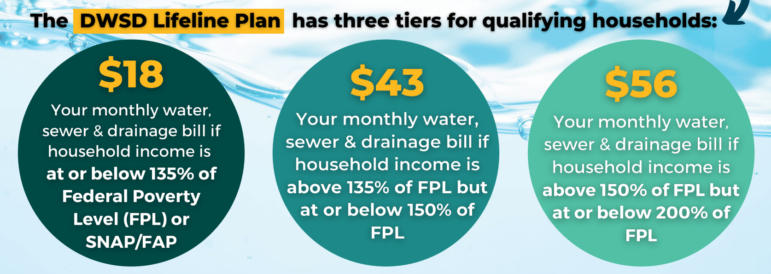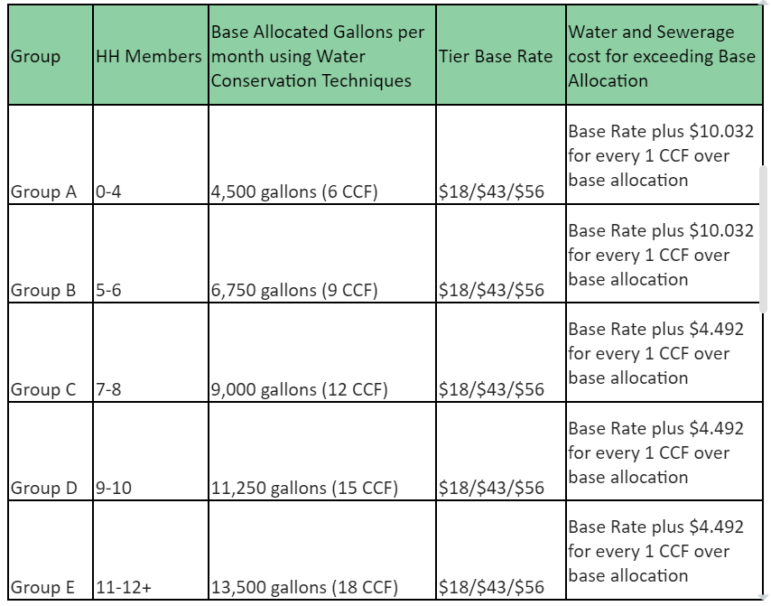
Detroit Water and Sewerage Department, Wayne Metropolitan Community Action Agency.
This is what households with different incomes pay for water bills under Detroit’s Lifeline Plan.By VLADISLAVA SUKHANOVSKAYA
Capital News Service
LANSING – The city of Detroit and a nonprofit agency have added 1,125 gallons of water per person per month to a program that prevents water shut-offs in low-income households.
The expansion is for a program launched in August to erase water bill debt, repair plumbing and lower monthly bills for low-income residents.
Other cities in Great Lakes states with similar programs include Chicago, Philadelphia, Pittsburgh and Milwaukee.
Before the city and the Wayne Metropolitan Action Agency created the program, residents who were behind on their water bills were protected by a moratorium on shut-offs during the COVID-19 pandemic.
“People fighting for the moratorium started with the onset of the COVID pandemic and recognizing that some of the ways to reduce the spread of COVID have to do
with having water,” said Laprisha Daniels, the executive director of Detroiters Working for Environmental Justice.
The Detroit nonprofit organization says it is dedicated to improving the environmental and economic health of city residents.
But the COVID moratorium expired at the end of 2022, creating pressure to find a longer-term solution.
“We know that Detroit water rates have gone up 407% over the last 20 years, and 120% in just the last 10 years,” Daniels said.
Under the Lifeline program, monthly bills are cut to $18 for households earning below 135% of the federal poverty level. A household of three people would need an income below $33,000 a year to qualify.
A household that is above 135% of the federal poverty level and below or at 150% pays $43; a household that is above 150% and below or at 200% pays $56.
The household with up to four people gets 4,500 gallons per month, said Bryan Peckinpaugh, the public affairs director at the Detroit Water and Sewerage Department.
With the recent change in the plan, households with five to six members get 6,750 gallons. If the household has more than 11 people, it gets 13,500 gallons.
Three people use around 2,300 to 3,000 gallons per month, according to the department.
Since the start of the program in August 2022, 9,000 residents have enrolled and 7,000 more are in the queue, said Shama Mounzer, the empowerment and integration services executive director at the nonprofit Wayne Metropolitan Action Agency.
About 85% of participants pay $18 a month.
Detroiter Sheila Gaddis said her water bill was $50 to $60 a month before she joined the program. And she got some needed repairs.
“My water heater stopped working and it was leaking,” Gaddis said. She got a water tank and a cracked toilet replacement from the program as well.
“I’m on disability but I’ve worked all my life,” Gaddis said. “Wayne Metro tremendously helped me. If it hadn’t been for them, I could lose my home because of the repairs and taxes and stuff like that.”
Two sources of money for the Lifeline program are the Great Lakes Water Authority and federal funding. So far, the program has spent $9 million of the $15 million it’s raised.
“In those two sources, we have enough to get through September 2024,” Peckinpaugh said. He added that another year of funding might come from the $25 million investment in a water shut-off prevention fund recently signed by Gov. Gretchen Whitmer.
Another effort to prevent shut-offs is a bill sponsored by Sen. Rosemary Bayer, D-Keego Harbor, that would declare a right to water as a human right.
“There’s just a lot of historical institutionalized racism in Detroit,” Daniels said, “and just not a lot of policies and protections in place to protect the health and well-being of Detroiters and water being a basic human right.”
The bill would require all state departments to establish water affordability criteria so everyonecan access “safe, clean, affordable and accessible water for human consumption, cooking and sanitary purposes.”
It’s pending in the Senate Housing and Human Services Committee. Cosponsors include Democratic Sens. Sylvia Santana of Detroit, Kristen McDonald Rivet of Bay City, Jeff Irwin of Ann Arbor, John Cherry of Flint and Mallory McMorrow of Royal Oak.
Water is recognized as a human right in New York state and by California.
Vladislava Sukhanovskaya reports for Great Lakes Echo.

Detroit Water and Sewerage Department
How many gallons of water a household can get with discounted rates.